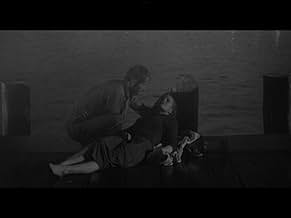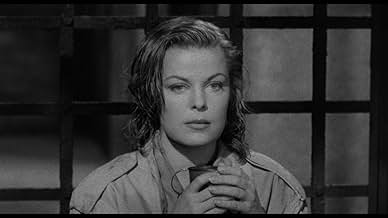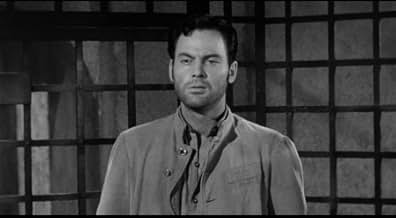Agrega una trama en tu idiomaA condemned murderer, scheduled to hang in the morning, asks for the company of a woman in his final hours.A condemned murderer, scheduled to hang in the morning, asks for the company of a woman in his final hours.A condemned murderer, scheduled to hang in the morning, asks for the company of a woman in his final hours.
- Dirección
- Guionista
- Elenco
- Dirección
- Guionista
- Todo el elenco y el equipo
- Producción, taquilla y más en IMDbPro
Opiniones destacadas
Hugo Haas John Agar & Cleo Moore Deliver a Fascinating Late Film-Noir
Hugo Haas, borrowing from Rodney Dangerfield Signature Line, "Gets No Respect".
He Got, Certainly, No Respect from the Hollywood Factory, was Ostracized when He Wasn't being Ignored, and Sent Packing to the Fringes of Low-Low Budget Film-Making to Apply His Talent.
"Necessity is the Mother of Invention", and Hugo Made-Do and Cranked-Out His Little "Slice of the Dark-Life-Look-Ins, on the Folks, Streets, and Stories.
Hugo Haas and Film-Noir Formed a Bond, and Produced some Significant "Primitive Art" that is, for the most part, Still Gets Little Respect to this Day.
Film-Noir has become More and More Respected, but Hugo Haas is one of its "Workers" that Still Lingers in the Shadows Waiting for Recognition. His Day Will Come.
Haas "Worked" in a Place that Main-Stream Hollywood Abhorred, and the Spirit of Film-Noir Found Fascinating, a Genre that Created Itself by Spontaneously Erupting to Life and Flourished in the 40's & 50's.
"Hold Back Tomorrow" is a Very Strange Piece of Work.
The Story of a "Murderer" and His Last Night Before the Hangman, Requesting a "Woman-Companion" and some "Music" John Agar is the Doomed-Man and Cleo Moore is the "Woman".
She, is First Seen Being Pulled from the River in an Attempted-Suicide.
There's a Noir Opening if there Ever Was One.
The Script Bends Over Backwards Trying to Define Her Profession, Suffice to Say, Former Factory Worker, Waitress, Dance Hall Dame, Escort, and Without Coming Right Out With It (the Code), Prostitute.
The 2 Noir Characters "Hook-Up" in the Hoosegow and to Say More would be Saying Too Much.
Because it's a Scene that Defies You to Find Another in the History of the Movies that is Remotely the Same Story.
Unique is an Understatement.
Discover this Hidden-Gem and See For Yourself Just what Mid-50's Films were Capable of with No Support from the Hollywood Elite or the then Current Conservative Restraint from "Gate-Keepers" of All Sorts.
This is "Primitive-Art" at its Best.
Hugo Haas, borrowing from Rodney Dangerfield Signature Line, "Gets No Respect".
He Got, Certainly, No Respect from the Hollywood Factory, was Ostracized when He Wasn't being Ignored, and Sent Packing to the Fringes of Low-Low Budget Film-Making to Apply His Talent.
"Necessity is the Mother of Invention", and Hugo Made-Do and Cranked-Out His Little "Slice of the Dark-Life-Look-Ins, on the Folks, Streets, and Stories.
Hugo Haas and Film-Noir Formed a Bond, and Produced some Significant "Primitive Art" that is, for the most part, Still Gets Little Respect to this Day.
Film-Noir has become More and More Respected, but Hugo Haas is one of its "Workers" that Still Lingers in the Shadows Waiting for Recognition. His Day Will Come.
Haas "Worked" in a Place that Main-Stream Hollywood Abhorred, and the Spirit of Film-Noir Found Fascinating, a Genre that Created Itself by Spontaneously Erupting to Life and Flourished in the 40's & 50's.
"Hold Back Tomorrow" is a Very Strange Piece of Work.
The Story of a "Murderer" and His Last Night Before the Hangman, Requesting a "Woman-Companion" and some "Music" John Agar is the Doomed-Man and Cleo Moore is the "Woman".
She, is First Seen Being Pulled from the River in an Attempted-Suicide.
There's a Noir Opening if there Ever Was One.
The Script Bends Over Backwards Trying to Define Her Profession, Suffice to Say, Former Factory Worker, Waitress, Dance Hall Dame, Escort, and Without Coming Right Out With It (the Code), Prostitute.
The 2 Noir Characters "Hook-Up" in the Hoosegow and to Say More would be Saying Too Much.
Because it's a Scene that Defies You to Find Another in the History of the Movies that is Remotely the Same Story.
Unique is an Understatement.
Discover this Hidden-Gem and See For Yourself Just what Mid-50's Films were Capable of with No Support from the Hollywood Elite or the then Current Conservative Restraint from "Gate-Keepers" of All Sorts.
This is "Primitive-Art" at its Best.
This is my favourite performance from the otherwise rather sterile John Agar. He is "Joe", on death row having been found guilty of strangling three women. He's decided to go out in Garbo style, wanting to be alone and angrily resisting any attempts from his family, or the priest, to comfort him as the big day nears. With twenty-four hours to go, though, he decides that the "company" of a lady might help ease his burden and obliged to help him out, the prison manage to recruit "Dora" (Cleo Moore). Now she's not in a very good place either - indeed had earlier tried to jump in the river; so a few dollars for a quickie with "Joe" didn't seem such a bad offer. Whilst there is certainly a predictability about the latter portion of this drama, it's still performed well and is tautly directed by Hugo Haas. Moore delivers an impassioned effort, indeed in many ways her character is far more intriguing than the sorry-for-himself "Joe". It is a bit dialogue-heavy, but for the most part that dialogue is worth listening to as we head towards the expected denouement - expected on just about every level. It does sail perilously close to melodrama at times, but it has a compensating grittiness and realism that I felt made this a much better than average tale to tell. You probably won't remember it for long afterwards, but it's enthralling enough when you watch.
John Agar himself has said (in an online chat hosted by Turner Classic Movies) that this was a "very strange" movie. Strange yes, but also intriguing in a low-budget sort of way.
Of course, the film is a retread of the old hooker-with-a-heart-of-gold romantic fantasy. (A much more recent example: "Leaving Las Vegas.") The Cleo Moore character, who agrees to spend the night with Agar, isn't actually identified as a prostitute, but we get the idea. We also know that the more time these two tormented souls spend together, the more they will get to know each other, and themselves, with a generous helping of psychobabble along the way.
But once you get past the obviousness of the film's rather incredible premise, not to mention a mawkish opening theme song, things get interesting in this modest, offbeat Hugo Haas opus. Moore and Agar deliver performances that are sincere, if at times a bit theatrical - he plays a condemned man who's mad at the whole world; she plays a suicidal woman who, despite her despair, is still capable of hope. Some of Moore and Agar's scenes together are nicely played out in long, continuous takes.
Unfortunately, the movie is nearly ruined by a frustrating, unresolved ending. Haas may have been trying for some kind of dramatically suspended moment, but it makes you want to yell at him: Tell us what happens next!!!
Of course, the film is a retread of the old hooker-with-a-heart-of-gold romantic fantasy. (A much more recent example: "Leaving Las Vegas.") The Cleo Moore character, who agrees to spend the night with Agar, isn't actually identified as a prostitute, but we get the idea. We also know that the more time these two tormented souls spend together, the more they will get to know each other, and themselves, with a generous helping of psychobabble along the way.
But once you get past the obviousness of the film's rather incredible premise, not to mention a mawkish opening theme song, things get interesting in this modest, offbeat Hugo Haas opus. Moore and Agar deliver performances that are sincere, if at times a bit theatrical - he plays a condemned man who's mad at the whole world; she plays a suicidal woman who, despite her despair, is still capable of hope. Some of Moore and Agar's scenes together are nicely played out in long, continuous takes.
Unfortunately, the movie is nearly ruined by a frustrating, unresolved ending. Haas may have been trying for some kind of dramatically suspended moment, but it makes you want to yell at him: Tell us what happens next!!!
This is a very original film on a very original story with very original actors, and even the music is original. Hugo Haas was something of a buccaneer in Hollywood, doing his own films, writing his own scripts, finding his own actors and team work, and the result is something of the most original and fascinating of film making during the great age of noirs. Here the film begins with a girl trying to drown herself by jumping into the river, she is rescued against her will and has to return to her more than dreary existence of nothingness, being threatened by being thrown out of her shabby room, having no place to go and no one to care about. By chance two policemen look her up with the strangest of offers: she will be paid $200 for keeping company with a prisoner sentenced to death during his last night, since that is his last wish. She doesn't care about anything and therefore accepts, and most of the film is just the two of them talking together in his cell, airing their mutual hopelessness and finding each other. That's the whole story. The dialog is amazing, extremely intriguing and well written, and the warden, the watchmen, his stepsister also play some part, but as a chamber play this is perfect and enduring. She will never forget her last night with a man sentenced to hang, and no audience could possibly ever forget this film.
I would love to see a Hugo Haas festival. At a theater or on television. If anyone was an auteur, it was Haas. His movies are similar to but better than those of Ed Wood. They are below the standards of some other contemporaries. But they seem to have been shot with little money.
Here we have a brunette Cleo Moore and Death Row inmate John Agar. She is a self-described "pickup girl." She looks it, too. It's very sleazy -- as it is meant to be.
This basically two-character piece was ahead of its time. I can imagine it with Al Pacino and Edie Falco.
Here we have a brunette Cleo Moore and Death Row inmate John Agar. She is a self-described "pickup girl." She looks it, too. It's very sleazy -- as it is meant to be.
This basically two-character piece was ahead of its time. I can imagine it with Al Pacino and Edie Falco.
¿Sabías que…?
- TriviaHugo Haas - who wrote, produced, directed and acted in most of his movies - doesn't appear in this film.
- ConexionesReferenced in The Ultimate Degenerate (1969)
- Bandas sonorasHold Back Tomorrow
Music by Franz Steininger
Lyrics by Johnny Rotella
Arranged and Conducted by Les Baxter
Selecciones populares
Inicia sesión para calificar y agrega a la lista de videos para obtener recomendaciones personalizadas
- How long is Hold Back Tomorrow?Con tecnología de Alexa
Detalles
- Tiempo de ejecución1 hora 15 minutos
- Color
- Relación de aspecto
- 1.37 : 1
Contribuir a esta página
Sugiere una edición o agrega el contenido que falta



























